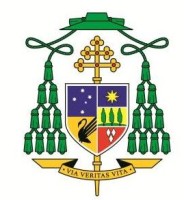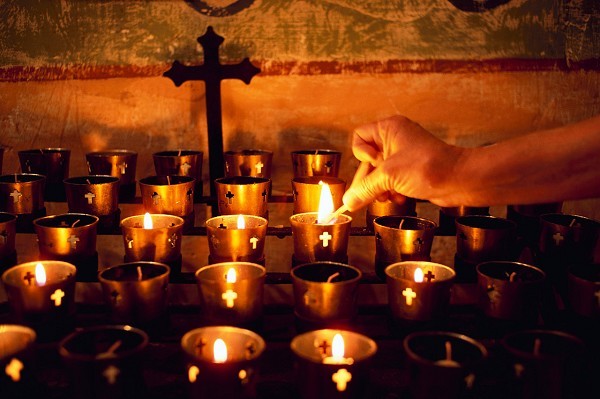Feast of All Souls

Homily by the Most Rev Timothy Costelloe, Archbishop of Perth
Feast of All Souls - Sunday, 2 November 2014
If our hope in Christ is for this world only then we are of all people the most to be pitied
(1 Corinthians 15:19).

As we celebrate today the feast of All Souls, which comes of course the day after the Solemnity of All Saints, I want to invite you all to reflect with me on this passage from St Paul's letter to the Corinthians. While there are many layers of meaning to this short sentence at its heart lies one of the most basic truths of our Christian faith. We are made by God and we are made for God and, as Saint Augustine once put it, our hearts will always be restless until we, finally and forever, find our rest in God. The life we live now, with all its beauty, its possibilities, its challenges and its inevitable moments of suffering and even failure is an extraordinary, complicated, exciting and often unpredictable journey. It is a journey, a pilgrimage, which is leading us unfailingly to a final encounter with the God who created us, who enriches us with so many good gifts, who calls to us to live our lives in love and in fidelity to his creative purpose for us, and who wishes to share his life and love with us forever. It is a journey, too, of freedom. God will not force his love on us and will not demand that we live with him in love for ever. Using human language we can say that God is like the loving father in the parable of the Prodigal Son. He gives us our freedom, watches in sadness if we choose to walk away, and waits in hope ready to throw his arms around us if and when we come to our senses and find our way back to him. Even more, he is like the shepherd who goes in search of the lost sheep and does not rest until he has found it. But if in the end, in spite of all God's gifts, and love, and living presence in our lives, we choose to say "no" to his invitation to friendship and finally turn our backs on God, God will respect our freedom, respect our choice, and not force himself upon us.
Of course, if we were to make such a choice, then the peace, and the contentment, and the fulfilment which we are seeking will never be ours. We are made for God, and our hearts are restless until we rest in him. If we, finally and forever, say "no" to God, then we can never know the peace that, according to Jesus, is his precious gift to us, a gift the world simply cannot give.
This is why St Paul reminds us that if we fail to understand who Jesus really is, and simply see him for example as a good man whom we can admire and perhaps emulate in some way - if we do not see him in other words as the Way to the Father, as the Truth about who God really is and what God is calling us to, as the source of real, and full and everlasting life - then we are indeed among all people those who need to be truly pitied.
For most of us this decision to say "yes" to God's offer of himself and of his love, this determination to hand over our lives to him by living each day as really committed disciples, friends, of Jesus, is something that unfolds over the journey of our life. It began at our baptism but for most of us this took place when we were still infants. Somewhere, somehow, that first in-breaking of God into our lives had to be really and consciously accepted personally. We had to give our own "yes" to what our parents once decided for us. Perhaps this happened in a moment of crisis, or a moment of conversion or awakening of our spiritual awareness. Perhaps it happened over a long period of time as we grew up in a good Catholic family. Perhaps it developed through our involvement in our local parish. The truth is, of course, that for most of us it is still a work in progress. Our "yes" to God is never as complete, as generous, as final as we would like it to be. And if this is true of each one of us here in the cathedral this morning, it is more than likely that it will still be true for us at the time of our death. Our life is a journey in which, if we are open to it, God works within us, through his Spirit, to gradually mould and shape us into the image of his Son that he created us to be. When we come to the end of our lives, if this moulding and shaping has not been completed in us because we kept compromising our "yes" to God with too many "no's", then God will continue the work of completing us so that we are able to be filled, fully and completely, with the gift of Christ's peace. Our hearts will truly be at rest because they will be fully in tune with the heart of Christ. Finally we will be everything God created us to be. This work of continuing to mould and shape us, of completing us, of purifying us, is what we in our Catholic tradition call Purgatory. It will be a painful process: true growth often is. But it is God's final act of love for us as God fully equips us for the great destiny for which we were made: to see God as he really is and enter into an intimate communion of life and love with him for ever.
Today, All Souls Day, we acknowledge with great honesty and realism, and also with profound hope, that those we have loved and who have died were, when they reached the end of their lives, almost certainly still in need of this divine work of completion. Because in their journey from this world to the next they moved from time to eternity, and because every moment of the past, the present and the future is known to God, we are confident that our ongoing love and concern, expressed in our prayer for our deceased relatives and friends, will even now, perhaps many years later, be received, and honoured and welcomed by God. In his mysterious plan God has bound us all so tightly together that our prayers for each other are, in God's mysterious providence, of real benefit to us. This is as true for those who have died as it is for us who are still alive. We do not understand how prayer for each other works - we simply believe that it does.
Today then we are encouraged by the faith of the Church to pray with great hope, confidence and trust, for those who have died. They are now in the hands of God who will, we confidently pray, complete his work of shaping and moulding them into the image of Christ, ready, in union with Christ, to enter fully and forever into that peace which is an intimate communion of life and love with God.
Eternal rest give to them O Lord and let perpetual light shine upon them. May they rest in peace. Amen.
